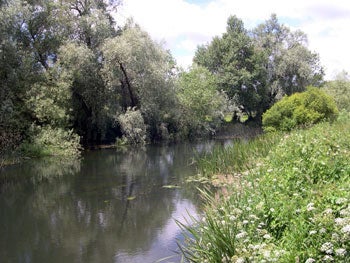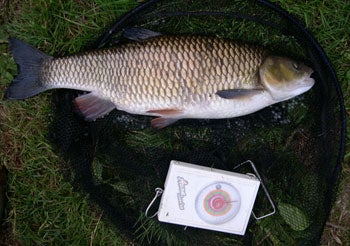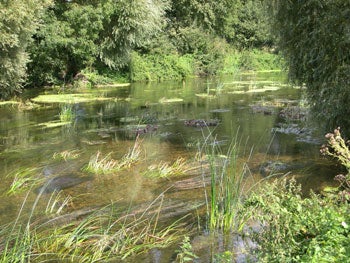| MARK WINTLE |
| Mark Wintle, an angler for thirty-five years, is on a quest to discover and bring to you the magic of fishing. Previously heavily involved with match fishing he now fishes for the sheer fun of it. With an open and enquiring mind, each week Mark will bring to you articles on fishing different rivers, different methods and what makes rivers, and occasionally stillwaters, tick. Add to this a mixed bag of articles on catching big fish; tackle design, angling politics and a few surprises. Are you stuck in a rut fishing the same swim every week? Do you dare to try something different and see a whole new world of angling open up? Yes? Then read Mark Wintle’s regular column. |
SUMMER’S OVER With the clocks going back at the end of October, for me the summer fishing is truly over. No more fishing for a couple of hours after work, and time to dig out the thermals. Yet this summer has almost dragged on through half of autumn. As I write the last two Mondays have had temperatures touching 70 Fahrenheit, though today’s (19th October) storms are far more autumnal (and welcome). Maybe at last the floods will come and wash the muck, all the duckweed, the cress and dead weed away, and put some flow back in our rivers.
And yet. Whilst I welcome the change of season I would be lying if I said that I hadn’t truly enjoyed my fishing this summer. I’ve been more single minded than ever, seeking chub, chub, and yet more chub. But there is so much to learn, and every time you think you find an answer it all changes, and you start all over again. But there have been some enduring lessons, and I’d like to expand on those. Learning from others I haven’t learnt everything on my own. Meeting other anglers has been an opportunity to compare notes, refine tactics, and discover new swims. I still don’t know whether boilies are better than pellets for bait, or whether braid is better than fluorocarbon for hooklinks, but isn’t that the fun of experimenting. Certainly, others have done much better than me for barbel (and chub but I never said I was an expert) though I must confess I’ve haven’t tried to locate barbel. Location, location, location Those big chub got that way through survival. That means they don’t hang around to get caught over and over again. So just because they were in one swim one day doesn’t mean they’ll still be there the following day. They might be, or might not… some time in the future they will return.
What this has meant is that I have looked for signs of chub when seeking swims rather than just sticking to the same old swims every time; visual presence (I can see them), patches of bubbles, swirls and rolls. If a swim has seemed dead after an hour I’ve moved provided it has been feasible; no point if there are no other swims available, or I’m about to pack up anyway. Once fishing there are other indicators that chub are present; line bites, tweaks, bites, and of course, landed fish. The best indicator that the swim is a good one has been a chub over five pounds. On more than one occasion this has been the precursor to a six pounder, on others to more five pounders; either way worth stopping for! Don’t scare them As Steve Spiller (Dog biscuit) quickly found out if you want to catch big chub don’t scare them. But scaring chub takes many forms. From sky lining them, heavy footsteps, nosy bank walkers to clumsy fishing with over heavy leads, poor casting technique, and the trickiest one of all, the slow increase in awareness that continuous fishing over several hours has on a wary shoal of chub. I have found that if you fish a swim for any great length of time (say five hours) the chub can become virtually uncatchable. One aspect of fishing that I have yet to figure out is my landing/weighing technique. As a match angler I, along with most other match anglers, had this to a fine art. You make your setup so that everything is to hand, and when you catch a fish you don’t need to get up, you simply unhook the fish and put it in the keepnet. With specialist fishing the tendency is to put the fish on an unhooking mat and to weigh it. As this involves getting up and moving around, the swim is disturbed. Perhaps I need to get more organised on match fishing lines (without the keepnet) and reduce the disturbance. Against that is the necessity to get up off my chair when I hook a big fish. Stour fish can pull back hard, especially in snaggy swims. In some swims it can pay to take a leaf from Peter Stone’s book and to get up quickly and walk back steadily when you hook a fish, pulling it away from a snag being far better than remaining static and trying to wind it in. Once it is clear of the snag you can walk back towards the fish and quickly gain line. Playing big fish in weedy swims takes fast reactions, a clear head, and sometimes a little luck. Like the five pounder that got wedged in a mid-river weed raft that I then dragged to the bank with its tail still stuck out of the water, and netted it complete with ten pounds of weed. Fluorocarbon and knots I’ve used Vanish in 4lb exclusively this summer for float fishing, tying on Drennan Feeder hooks using a hook tier. I’ve used Krystonite in 8lb as hook link on the lead. I’d be lying if I said I hadn’t got broken (yet to break the Krystonite) but it has been far more due to my failure to react quickly enough in tight situations, and there haven’t been that many times either. Nevertheless, I am going to try Riverge Grand Max in the light strains for float fishing as I find Vanish thick and stiff for its breaking strain. Along the way I’ve had to learn some new knots (for me that is). The knotless knot was easy, the figure of eight loop is coming along, and I have finally mastered the grinner knot and the water knot. Roving, roving, roving… There are few truly horrendous walks on the Stour, the banks are flat, and you rarely need to walk more than about a mile, often much less, but it pays to be able to travel light. I got around to weighing what I’ve been carrying all summer. Although it is more than I’d like, I feel that I am properly equipped to tackle a wide variety of swims, to be able to record my catch properly, and to be comfortable when fishing. So what do I carry? My Fox bag has two reels, spare spools, line, hooks, scales, camera, floats, feeders etc, and weighs fifteen pounds. My JRC chair weighs just five pounds, my bait bag typically weighs twelve pounds, and my rod holdall, with a specimen float rod and chub rod, landing net pole and bankstick is another nine pounds. To this I might add waterproofs, but typically the weight is only just over forty pounds. For comparison, my full match gear, in the days when I took it seriously, weighed over a hundred pounds, sometimes more (no wonder I developed back strain). What I am carrying is easily manageable, and with slight adjustments will be fine for my winter fishing. Not proper fishing! Peter Jacobs recently mentioned to me, somewhat tongue in cheek, that fishing with pellets and boilies did not constitute proper fishing. What can I say? If it works, what’s the problem? Apart from the consistent results, the bonus has been little to worry about in looking after my bait, no need to keep it refrigerated, or it turning into flies after a week, just convenient. Hair rigs and bites No doubt the debate will rage for years but to fish boilies for chub you need to hair rig them (in my book anyway), and that means missing a few bites. To counter this I fish with light link legers to try to persuade the chub nothing is amiss. Really though, I am playing a percentage game; get enough bites and I’m bound to hit a few, and that’s how it’s been this summer.
Smelling the roses Roses might be few and far between on Throop and other parts of the Stour but quietly sitting fishing has been a marvellous opportunity to watch the wildlife. Egrets, kingfishers, herons, warblers, ducks (joking about the ducks!), water rail, robins, buzzards, sparrow hawks, owls, all have got close, some a little too close like the sparrow hawk that nearly knocked my hat off diving into a bush after the long tailed tits. Mice and slugs have come after my pellets, and bats have flitted around my rod tip, and one otter has briefly shown late one evening when the crowds have departed. Solitude is hard won when one is so close to a busy conurbation, and it will be much quieter during the colder months. A little extra One essential ingredient to success has been carrying around a big bucket of confidence; you can’t buy it but without it you are never going to catch tricky fish like the big wised-up chub of Throop. You have got to believe that you are going to catch no matter how tricky the fish. At least ten times I have caught big chub first cast (sometimes from a foot of water) which means stealth, cunning feeding and a faultless first cast. Of course, I’ve failed from time to time. I’ve picked the wrong swims; got my tactics wrong; sometimes simply found that the fish weren’t having it, maybe even hammered/scared earlier in the day – one of the disadvantages of a popular fishery. Weather changes made the chub moody at times but I only suffered three blanks all summer. A week after I started writing this, floods are on the way; winter fishing won’t be too far away, and plenty to look forward to, including, I hope, some good roach fishing, and maybe some more big chub. |
















